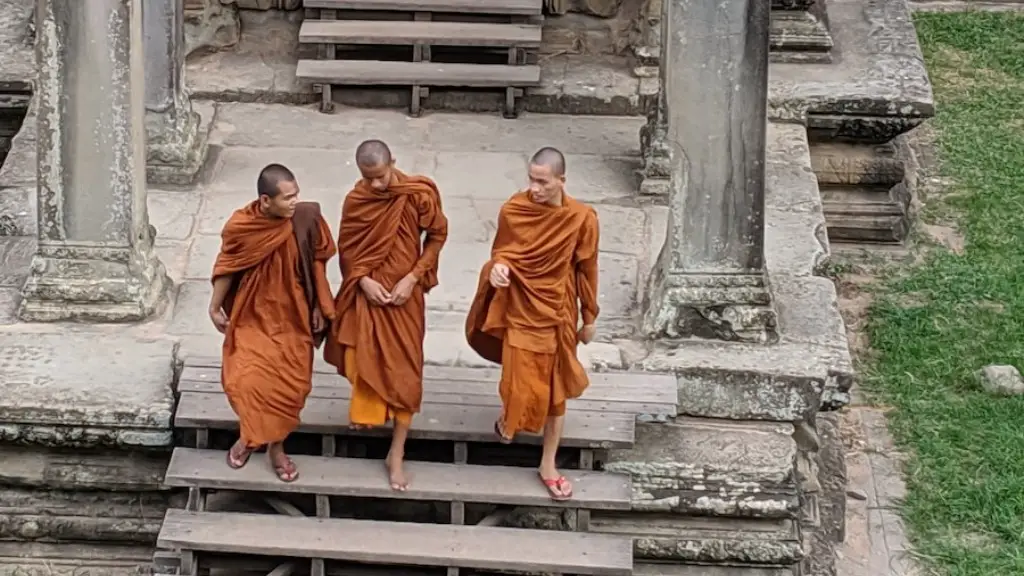There is no single answer to this question as different schools and traditions of Buddhism have different beliefs in regards to the existence or non-existence of a supreme being or creator. Some Buddhists may believe in a pantheon of gods and goddesses that exist within the cosmos, while others may see the Buddha himself as the highest god, and still others may believe in no god at all. Ultimately, it is up to each individual Buddhist to decide what they believe in regards to this matter.
Buddhism does not believe in a personal god.
What is god called in Buddhism?
The Buddhist teachings on devas and other deities are quite interesting and provide a different perspective on these beings. According to the teachings, there are divine beings called devas who inhabit different heavens. These beings are not immortal, but they do have a much longer life span than humans. They are also said to be much more beautiful and have greater powers than humans. In addition to devas, there are also other Buddhist deities that are said to inhabit different rebirths in the cycle of saṃsāra. These deities are also not immortal, but they do have the ability to influence the lives of humans in positive or negative ways.
The Three Buddhist Deities Vajrapāṇi, Mañjuśrī and Avalokiteśvara are some of the most important and widely worshipped deities in Buddhism. Each of them represents different aspects of the Buddhist teachings and have their own unique stories and legends.
Vajrapāṇi is the bodhisattva of power and strength who is often depicted holding a vajra, or thunderbolt. He is said to be the protector of the Buddha and the Dharma, and is often invoked in rituals for protection and success.
Mañjuśrī is the bodhisattva of wisdom and is often depicted holding a sword. He is said to represent the perfect wisdom of the Buddha, and is often invoked in rituals for wisdom and clarity of mind.
Avalokiteśvara is the bodhisattva of compassion and is often depicted holding a lotus flower. He is said to be the protector of all beings, and is often invoked in rituals for compassion and protection.
What do Buddhist believe about Jesus
There are some high level Buddhists who have drawn analogies between Jesus and Buddhism. For example, in 2001 the Dalai Lama stated that “Jesus Christ also lived previous lives”, and added that “So, you see, he reached a high state, either as a Bodhisattva, or an enlightened person, through Buddhist practice or something like that”. Thich
In Buddhism, there is no concept of punishment or reward. There is no divine being who decides who goes to hell or heaven. There is merely the illusory results of our thought, words and deeds, which we call karma.
Is A Buddhist an atheist?
Atheism is not a central tenet of Buddhism or Jainism, but both traditions have been critical of theistic beliefs at various points in their history. For Buddhism, the rejection of a creator god is rooted in the Buddha’s own teachings; he argued that belief in such a god is a distraction from the real goal of human life, which is spiritual liberation. Jainism, meanwhile, has traditionally been critical of the caste system and the social inequalities that it perpetuates. In this respect, Jainism’s rejection of theism may be seen as a political statement as much as a philosophical one.
This is a traditional Buddhist prayer for freedom from suffering and the causes of suffering. It is also a prayer for equanimity, or a state of balance, in which we are neither too attached nor too averse to anything.
Who is the highest god in Buddhism?
In Buddhist texts, Mahābrahmā is sometimes referred to as the leading deity and king of heaven, Brahmā. Mahābrahmā is said to be the creator of the world and everything in it, and is also the teacher of the Dharma to humans. He is often depicted as a wise and powerful being, and is said to be very kind and compassionate.
Buddhism is a religion without a belief in a unique creator God. It is a form of trans-polytheism that accepts many long-lived gods, but views ultimate reality, Nirvana, as beyond these.
Do Buddhist believe in the Holy Spirit
Buddhism is a religion that does not believe in any kind of deity or god. However, there are supernatural figures who can help or hinder people on the path towards enlightenment.
Buddhists celebrate Christmas in their own way, often seeing Jesus as an avatar of being blessed to our beloved Earth. While they may not celebrate in the traditional Christian way, Buddhists still find joy and happiness in this holiday season.
What do Buddhist believe happens after death?
Death is a natural part of life, and Buddhists believe that it can be an opportunity for liberation from the cycle of life, death and rebirth. After death, consciousness (the spirit) continues and may be reborn. This teaching views life and death as a continuum, and so there is no need to fear death.
The Pali word “papa” or “apunna” literally means “defilement” or “evil.” In the Buddhist context, it refers to the evil elements that defile the mind and have a deadening effect on the psyche, making it difficult for it to be uplifted. These elements can take many forms, such as greed, hatred, and delusion.
Do Buddhists believe in karma
Karma is a central concept in Buddhism. It refers to the idea that each action has consequences, both in this life and in future lives. This means that bad actions in a previous life can follow a person into their next life and cause bad effects (which Westerners are more likely to interpret as “bad luck”). Even an Enlightened One is not exempt from the effects of past karma.
This concept of karma can have profound implications for how we live our lives. It reminds us that our actions have consequences, both for ourselves and for others. It also teaches us that we have the power to change our future by changing our actions in the present.
Most Buddhist traditions assert that there is no permanent, unchanging self or soul. This is in contrast to many other religious traditions which posit the existence of such a permanent entity. The Buddhist perspective is that the atman is an illusion, and that clinging to this illusion is a source of suffering.
What do Buddhists believe in instead of god?
Buddhism is a religion that does not acknowledge a supreme god or deity. Followers of Buddhism instead focus on achieving enlightenment—a state of inner peace and wisdom. When followers reach this spiritual echelon, they’re said to have experienced nirvana. The religion’s founder, Buddha, is considered an extraordinary being, but not a god.
Buddhism is a reaction to the orthodox religious and philosophical traditions of India. The Buddha, Siddhartha Gautama, attacked the brahmanic idea of the caste system and the dogmatic authority of the Vedas. He taught that all human beings could achieve salvation through their own efforts. His followers, known as Buddhists, spread his ideas throughout Asia, and Buddhism became one of the dominant religions of the continent.
Can a Buddhist get married
Buddhist marriage is a very traditional and simple affair. They don’t like to use lots of complicated rituals and it is not a religious affair. During a Buddhist marriage, the bride can change her dress up to 5 times!
Buddhavacana texts are a class of texts which Buddhists see as containing the direct words of the Buddha. The concept is important in understanding how Buddhists classify and see their texts. Buddhavacana texts have special status as sacred scripture and are generally seen as in accord with the teachings of the historical Buddha, which is termed “the Dharma”.
Warp Up
There is no one answer to this question since there is no one god that Buddhism believes in. Some schools of Buddhism may focus on a particular god or pantheon of gods, while others may teach that any god or gods are ultimately unimportant.
Buddhism does not believe in a god or gods.



